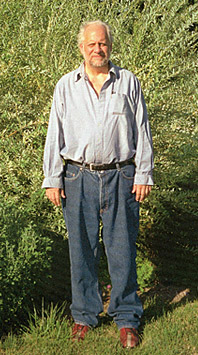“We, the Flowers. . .”
In the famous art song “Where’er You Walk” by Handel, the branches of trees bend to provide shade for the singer’s beloved. I had a similar experience last week. I was inspecting the first flowers of my Magnolia tree, when one of the lovely blossoms beckoned me over, with a soft and delicate voice but surprisingly urgent tone.
It summoned, “Mr. Ball! Mr. Ball!” I answered, “Yes?” “I know you welcome us—and all other flowers—in the spring, adore us in the summer and mourn our poignant beauty in fall. We have even seen you—through our latent winter buds—as you sit gazing at your imported houseplant while the snow falls in the dark evenings. We know you love us deeply, which is why we choose you to be our champion in these troubled times in the flower world. You humans domesticated us—and you need to take better care of us. Pull that bench over because I have much to tell you.
“Mr. Ball, you humans puzzle us deeply. On the one hand, we celebrate your existence from birth to death, with marriage in between. One of our clan, Gypsophila, also called Baby’s Breath, is named for the first breath a newborn draws. When your species comes of age, young men and women decorate themselves with us—in hair, hat and lapel.
“Briefly, men soften and pick us and give us to their lady friends, while the more demonstrative of them clench us between their teeth while they play guitars!
“I shall pause and let you consider our smitten troubadour clenching a plastic flower stem. I assure you he would gag. One hundred million years of co-evolution between us and humans tells us so. Remember: we domesticated you too!
“Or imagine our lover presenting his lady a nosegay made of acrylic polymers. Would you like to guess the length of this romance? Or imagine a bride tossing a plastic bouquet to the hopeful unbetrothed.
“Once we were mighty. We led you into battle. We symbolized the promise of salvation and eternal life. As Christians approach Easter, they look forward to the flowerless churches during Lent abounding with live blooms symbolizing the Resurrection.
“We represent life—from birth to reproduction to death. We have been giving you beauty, as well as inspiring you to create it yourselves, since you began to walk. Yet, now, you walk away from us.
“In your homes, our images are everywhere: imprinted on plates, tea cups, couches, linens; engraved in silver; carved in wood. We are endlessly portrayed in paintings, architecture, jewelry, tapestries, murals, ceramics and every other form of visual pleasure. We are strewn throughout poetry, song, legends and stories. We are enshrined in nearly every religion. If an alien were to pay a visit to our verdant planet, he would assume humans worshipped us. If only this were the case!
“You, Mr. Ball, know this, of all mortals. As a seedsman, you know that we are the alpha—the summit of botanical creation. Without us, no seeds. Without us, no fruits or vegetables. Without us, no life.
“We ask you to proclaim this, Our Flower Bill Of Rights.
“We, the Flowers, to form a more colorful and fragrant world, demand that humans stop using flowers fashioned from plastic—that non-renewable material so quintessentially unlike us. Stop flying us all over the world. You grow us in exotic locales. We’re picked too young—the insult of insults in our world—and stuffed in a box by virtual slave labor.
“Grow us locally. If not your own back yard, use solar energy to fuel new US greenhouses. Breed us for North America’s cooler temperatures—we can take it! We’ve been living outside a lot longer than you have.
“We gave you your first happiness—color. We gave you, through our fruit, your second happiness—taste. We love you and work tirelessly for you. Yet, these days, except for your churches and a few holidays here and there, you ignore us. You even ask the grieving to avoid our comfort and consolation when a loved one dies. But we flowers have been scientifically proven to raise human spirits. We are nature’s anti-depressant!
“Mind the consequences: the flowers of weeds don’t care about you. Weeds will smother trees, even me, your beloved Magnolia. Avoid a war with weeds. As your ancient ancestors knew, you’ll lose, which means we—your friends and allies, the domesticated plants—will lose too.
“So, humankind, please grow us, pick us and use us for your rituals of life. Ensure that your descendents celebrate their lives with our beauty and meaning. And we promise to return each spring.
Signed,
The Domesticated Flowers of the World.

Yes, one of the strangest sights is a peaceful green cemetery full of graves and headstones and everlasting plastic flowers or a front garden decorated with live greenery and silk flowers.
Thank you for your thoughtful response—and the only one, thus setting a record here for the past two years at our struggling little blog. You are more than unique! In fact, you touch on an area of horticulture where the US doesn’t merely lag behind. Cemetery gardening hardly even exists. No pulse, you might say. Contrast it with Germany, where most cemeteries have their own staff horticulturists. Each plot is like a separate tiny garden. Some, as in the Black Forest towns and cities, are profoundly poignant. The Germans have always had an almost Asian-like ancestral pull. Thanks again.
P.S. If you don’t mind, Wanda, I shall use this opportunity to correct the blog article I posted. ‘Where’er you Walk’ is an aria, not an art song. It’s from the opera, Semele, which concerns the mother of Dionysis or Bacchus, as the Romans later called him. His father was Zeus and his mother was Semele, according to one of several myths. But in all of them, Zeus was perfectly capable of making tree branches bend, and flowers turn their heads to follow a great beauty as she passed along.